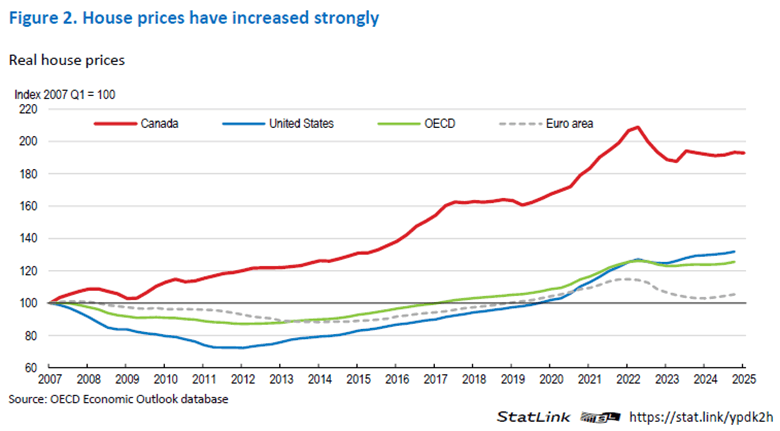MNI: BOC Cutting Interest Rate On Tariff Pain, OECD Predicts

The Bank of Canada will lower interest rates later this year as the tariff war drags down growth more than it sparks inflation according to an OECD report Monday.
The policy rate will average 2.4% over this year, lower than the current rate of 2.75% according to the Paris-based group's annual review of Canada's economy. The benchmark overnight rate has averaged about 2.9% so far in 2025.
Next year the OECD says the rate will average 2.3%. That could amount to the Bank keeping the rate around 2.25% for the entire year. (See: MNI INTERVIEW: Dodge Sees BOC Cutting To Low End Of Neutral)
"Further monetary easing should be implemented if the economic situation strongly deteriorates and assuming that tariff-related inflationary pressure remains under control," the report said. "The economy is now facing significant headwinds from rising tariffs with the United States."
Canada's economy will contract starting this quarter and limiting GDP growth to about 1% this year and next, though the report didn't say there will be a recession. Governor Tiff Macklem said last week GDP will weaken in the second quarter with exports fading after a burst of shipments as U.S. customers sought goods before tariffs were imposed.
DEFICIT AND HOUSING WARNINGS
The Bank's next decision is June 4 and economists see a hold for a second meeting and perhaps two or three more cuts later this year as the economy weakens. Inflation will "rise only slightly above" the Bank's 2% target as price increases related to tariffs are blunted by the recent cut to the federal carbon tax, the OECD said, adding core prices will remain elevated. (See: MNI INTERVIEW: Tariff Uncertainty Means Lower BOC Rates- Ragan)
The OECD criticized the fiscal stance of Justin Trudeau who quit earlier this year and was replaced by Mark Carney, saying budget plans clashed with monetary policy. Carney's platform ahead of the April 28 election showed even larger deficits over the next four years.
"Fiscal policy was expansionary in 2024 while monetary policy has been restrictive in 2023-2024. Consequently, the accommodative fiscal policy has partly counterbalanced the restrictive stance of the Bank of Canada to fight inflation," according to the report.
While Canada's deficit has moderated more than some global peers the government must be cautious about new stimulus and curb debt after the trade shock eases, the OECD said. "Additional fiscal support that the government may decide to introduce should be timely, targeted and temporary. If the tariff shock becomes prolonged and has more severe economic consequences, it will be important to allow the economy to adjust to the new environment without safeguarding specific businesses or sectors."
There was also a warning about how even Canada's resilient banks are vulnerable through a long housing and consumer debt boom. "Risks, particularly those related to the domestic mortgage market, remain significant and warrant careful oversight and a pursuit of stringent prudential regulation."
